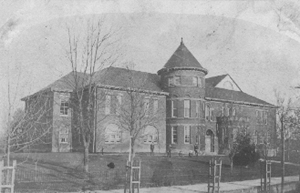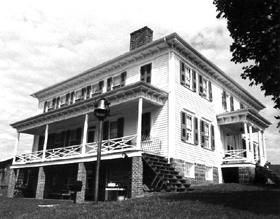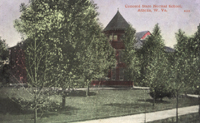
Athens
Prepared and Read By Mrs. Will Gore
At The Athens Community Conference

Prepared and Read By Mrs. Will Gore
At The Athens Community Conference
Athens Community has contributed to the world at large a number of useful and brilliant people. They may not be of worldwide fame, very few persons are, but in their own ways and in their own spheres of helpfulness they have contributed much to the general happiness of humanity.
Seven of our young men have become ministers, one was a presiding elder in the church when he died, and one has been in China as a missionary for more than ten years,
Every one recognizes the fact that physicians are a very necessary and helpful part of any group of people. Athens has furnished to the world sixteen physicians, honored and beloved in the communities in which they have cast their lots. One of these held a state appointment, as superintendent of a state hospital for several years.
Ten Dentists have rendered assistance of particular satisfaction to many people in this and other communities. Eight of the ten were our own town boys. The other two lived not far out of town, and one of them lived in the town for a while and practiced his profession.
Eight of our boys are lawyers, and one of them is a candidate for the state Senate at the present time. Six of our people have been elected to represent our county in the state Legislature. Five of our boys have become bank cashiers, a position of honor and trust.
Six of our girls are trained nurses, a helpful and unselfish calling. One of our girls is an authoress of considerable note, locally, at least, and one of our boys was editor of an Oregon paper and later of a Chicago paper; he is also a poet and has had a number of his poems published.
| Many of our town girls have received instruction in music at the Music Department of Concord State College, and some have gone to higher institutions of music. One is a graduate of Cincinnati Conservatory of Music and of Cornell Public School Music Department, and is now a candidate for graduation in The Institute of Musical Art, New York City. Four boys and two girls of Athens community have received degrees from West Virginia University, and eight are candidates for the A. B. degree this year (1924) at Concord State College. |  |
Several young men have entered civil engineering, several have become successful merchants and business men, to whom wealth has come as a reward for their labor and ability. Much might be said of those who have remained on the farms. They should never be overlooked, for all the others depend on the farmer for sustenance.
And what shall be said of the good housekeepers both here and in other communities which they are enriching by their presence? No one can sufficiently appreciate all they mean to a community, and the extent to which all other things depend on the home. We have some of the best cooks in all the world, right here in Athens, and many of them are in homes of their own in other places.
 |
At this time, forty-six of the residents of Athens are engaged in teaching. We have a list of teachers from the town and immediate neighborhood which number two hundred and sixty, and there may be others of whom we have no record. Some of these have passed on to a fairer clime: many are happy wives and mothers, for matrimony depletes the ranks of teachers every year; others have gone into other avenues of usefulness; but all these are our own and they have all been engaged in the great work of teaching. Our boys and girls |
In giving a history of this community, I shall have to refer to the time of the previous generation, as I obtained most of this data from my father, William Holroyd, who came to Mercer County in 1848 and bought a farm two miles from Athens.
At that time there were no churches in this community, but the people worshiped in the homes. Eight Martin brothers had settled near Athens, and their homes were used as places of worship. Once a year a camp meeting was held at the place where Uncle Davy Martin lived. At one of these meetings the citizens got together and decided to build three churches: One at Athens called Concord, one called Bethel in the Danielly neighborhood, and the other called Pisgah in the Johnson and Stafford neighborhood.
The county road ran through this territory and Concord church was built by the side of the road where the Methodist church now stands; the present one being the third that was built there. Captain Holroyd had charge of the building of the churches, and the people hauled the lumber, made the shingles, etc., for the buildings. They got on so agreeably that a lady suggested the name of Concord. This was a Methodist church, but was used by all orthodox denominations.
My first recollections of this church are of hearing old Brother Bird, who was a primitive Baptist preacher, and who used the church regularly each month for years and years. Brother Campell, a Missionary Baptist minister also had his regular appointments in this church. Old Brother Bennett, a pioneer Methodist, preached here often, and Brother Workman the first Methodist Episcopal preacher who came into this community after the Civil War did a fine work. This work was in the Holston Conference and the work was so large and of so vast a territory it took a month to get to all the appointments which were made on horse back. This church stood through the trying days of the Civil War which devastated this whole community.
At the time of the Civil War Summers County had not been cut off, so Mercer had quite a large territory. In 1869 the people in the northeastern part of the county became dissatisfied as to the distance they had to go to Princeton to court. The Court House had been destroyed by fire and it was necessary to build a new one. The people in the lower end of the county began to clamor for the Court House to be built at Concord, and at the election a vote was taken and carried in favor of Concord for the County Seat. Geo. Evans was County Clerk, and he moved the documents to Concord, into a four-roomed log house that had been built for the purpose. David Alvis was assistant clerk.
A post office was established and named Concord Church. J. F. Holroyd, though quite a lad, was made postmaster and held this office for years. Courts were held in the church. Captain Holroyd had built a store room and was selling a great deal of goods, and saw the need of a building to accommodate the people who came to Concord to attend court and other business matters, so he built a large frame building. It was called the Mountain House. He then sold his farm and moved to Concord. Dr. James Vermillion and Benjamin Fanning also helped to take care of the crowds that came to Concord to attend court.
At least fifty cots were brought into the "Mountain House" at one time and as the upper floor, at that time, had no partitions these cots were put up there and it was called the "Big Survey" and as there was a saloon opposite the church this "Big Survey" grew quite noisy at times. It was quite common to see "Uncle George" an old colored servant going back and forth to the "Big Survey" with a large waiter filled with glass tumblers. Afterward Old Brother Sheffey prayed that this saloon would cease and a shoe shop be installed in its place. This really did happen, for soon afterward a shoe and harness shop was started in the same place by Stewart Johnston (father of Mrs. Higginbottom of our town) Mr. Johnston lived here and educated his children here.
| Colonel Henderson French gave the land as a site for the new court house and a brick court house was being erected, but when the wall of the first story had been completed the people of Princeton and vicinity called for another vote to move the court house to Princeton. This time the vote carried in favor of Princeton. This threw things in quite a dilemma. About this time the State Board of Control decided to build another Normal School, and this unfinished wall was the incentive for Concord to ask for the Normal School. |
 Col. William Henderson French House, near Athens |
In the meantime Colonel Henderson French died without making a deed, but William Martin and wife gave the site where the Normal was built, and where the Concord Training School now stands. In the spring of 1875 the Normal School opened in a frame building with about 75 students. Captain Harve French was the Principal and remained so for seventeen years. Major Reynolds was his assistant. The school was in session for five months. It closed for the winter but opened again in the spring. The students came in by numbers; some walked for miles and the people could not accommodate them, so Dr. Vermillion and Mr. Fanning built cottages for the accommodation ef the students, and "Loafer's Joy" was added to the "Mountain House".
Boys did not mind those days to "crowd up" and would gladly room six in a room. Of course things were very crude but the students were so eager for an education and appreciated any kindness that was given them. People began to move in with their families, and a number of houses were built. Commencement was quite a gay time, people came in wagons, hacks, buggies and on foot, and the little village was very lively and festive.
The Christie Brothers gave music lessons on the piano and violin. The first piano in Concord was brought to the "Mountain House." At one of our Commencement exercises the Christies had gone away, so there were only Mr. P. W. Massie and myself left to furnish the instrumental music. There had been a very fine prayer offered which was supposed to be followed by sacred music. Captain French looked around and seeing none of the girls who were to sing, nodded to me and Mr. Massie who struck up the "Mississippi Sawyer", which I accompanied on the piano. Afterward the Captain gave us quite a reprimand. "Well it was either that or Arkansas Traveler and I can't see any difference," replied Mr. Massie. The town has grown slowly, but steadily. In 1871 the Masonic Lodge was organized which now has a membership of about one hundred and seventy. We have an Eastern Star Chapter, also Royal Arch. We have a civil betterment club which does a fine work, they have a Soldiers' Memorial Library open to the public. The business men's club is very progressive. They established the bus line with the assistance of Princeton men, which adds a great service to the people, and especially the students. We have three churches, three Missionary Societies. We have had the county fair in our town for three years and under the leadership of our efficient county agent, W. H. Roberts, it has grown bigger and better every year. Without being present in the community it is hard for anyone to realize how much this community has improved.
The post office was named Concord Church, but the students left off the "church" so letters often went to Concord in Hampshire County, West Virginia, so in 1896 the faculty met to discuss the matter and Mr. Fulwider suggested the name of Athens and it was so named.
| In 1910 the large brick building was destroyed by fire, and the school was taught in the churches, the Masonic Hall, and where ever room could be found, Tho people even offered their homes to bo used by the school. After a long, hard fight by the people of Athens the Legislature appropriated money for a new building, and the citizens of Athens bought twenty-six acres of land from S. T. Vermillion where our beautiful and commodious buildings now stand. |  |